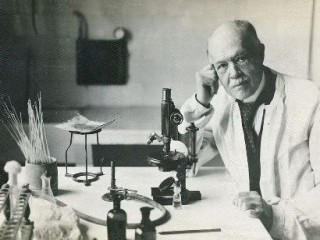
Charles Nicolle biography
Date of birth : 1866-09-21
Date of death : 1936-02-28
Birthplace : Rouen, France
Nationality : French
Category : Science and Technology
Last modified : 2011-12-17
Credited as : bacteriologist, Found that lice transmit typhus, Nobel laureate
0 votes so far
Nicolle studied cancer, diphtheria, influenza, measles, rinderpest, scarlet fever, streptococci; tick fever, trachoma, tuberculosis, and whooping cough. He devised a vaccine to prevent Malta fever, and won the 1928 Nobel Prize for research proving that typhoid fever is transmitted to humans from lice. Subsequent research established that lice excrement can also carry typhoid, and that another variant of the disease, murine typhus, is carried to humans by the rat flea.
Nicolle surmised that he could make a simple vaccine by crushing up the lice and mixing it with blood serum from recovered patients. He first tried this vaccine on himself, and when he stayed healthy he tried it on a few children (because of their better immune systems), who developed typhus but recovered.
He did not succeed in his effort to develop a practical vaccine. The next step would be taken by Rudolf Weigl in 1930.
Author of books:
-La Magot Animal Réactif Du Trachôme (The Animal Magot Reagent Trachoma) (1912, research)
-Le Destin des Maladies Infectieuses (Fate of Infectious Diseases) (1930, research)
-Biologie De L'Invention (Biology of Invention) (1932, research)
-La Nature, Conception et Morale Biologiques (Nature, Design and Biological Morality) (1934, research)
-Responsabilités de la Médecine (Responsibilities of Medicine) (1935, research)
















